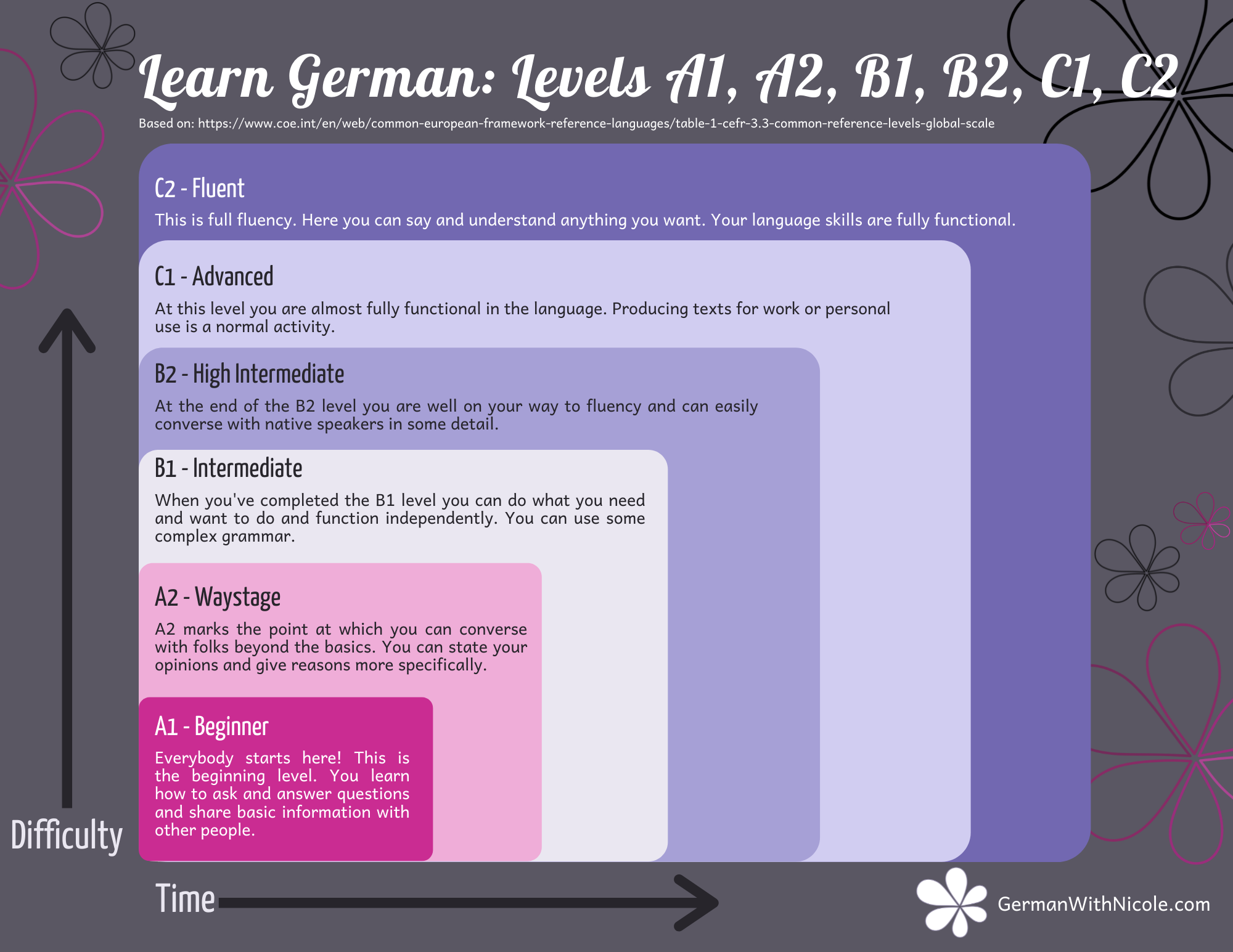In this 5th episode of the GermanWithNicole.com Podcast you'll learn what these designations mean for German learning.
You've surely seen this alphabet-number combination on German learning materials and maybe you've seen or taken a German language assessment test and received one of these combinations as a result. “You can take a class at the A2 level.”
But what does it mean?! And why should you care?!
Hint: Understanding these combinations will make your German learning life sooooo much easier. Answers to those questions and so much more today!
N.B. The Weekly German Practice is closed, and while the GermanWithNicole.com Podcast no longer exists, you can still hear all of the audios here on the blog. The audios are available on the blog posts published between August 1, 2021 and October 1, 2024. Viel Spaß beim Hören!
To go along with this episode you'll find a graphic below that will help you understand how these things fit together.
The audio by itself or the graphic by itself would be incomplete, so it's a great idea to listen to the audio and to view this graphic at the same time.

What is A1, A2, B1, B2, C1, C2 in German learning?
These are the names for the six levels of learning a foreign language as defined by the European Union. You start at A1, then move to A2, then B1, B2, and then C1 and then C2.
Each level builds upon the previous level, and as many of my German learners have heard before, A1 s your foundational level for German. You can't build a house on sand, that's why A1 is really important. (More to this next year.) When you learn the A1 topics well, it creates the foundation for the A2 level. When you've solidified those skills, then B1 builds upon those.
There's a bit of a variation, too:
You may have a book that is an A1 book, but the publisher can split that book into two parts, so the first half of the book is A1.1 and the second half is A1.2. Some classes are named like this, too.
Why should you care about these levels? What do they actually mean for you?
Because they will make your German learning significantly easier! You can stick with materials at your level so you don't get overwhelmed.
Think of learning German like a buffet. The CEFR helps you determine what should be on your plate for your first visit, your seconds, and what should stay on the buffet.
You also need to know what these levels mean because I'm going to start using them here on the podcast. You'll be able to read a title and listen to the podcast, knowing it's something you can incorporate now, or perhaps you'll find out what's on the buffet and you can come back to it later.
How long does each level take?
The short answer to this question is: it takes as long as it takes. The long answer is: you have to find out, because if you never start learning German, or return to it, or keep on with it, you'll never find out how long it takes you to complete a level.
You are not linear, nor is language learning. Learning is not time-bound, it is based in experience.
What does CEFR stand for?
It stands for Common European Framework Reference for Languages, which is a set of specifications used to help guide educators and learners in foreign language settings.
These are not standards, they are specifications. They are based on can-do descriptors, meaning you will acquire specific skills which are all related to one another.
Let's take the first level, A1, as an example:
Can understand and use familiar everyday expressions and very basic phrases aimed at the satisfaction of needs of a concrete type. Can introduce him/herself and others and can ask and answer questions about personal details such as where he/she lives, people he/she knows and things he/she has. Can interact in a simple way provided the other person talks slowly and clearly and is prepared to help.
How does the CEFR help you learn German?
It helps you like this: for an A1 learner, the expectations are that you can:
- understand and use basic and everyday expressions
- introduce yourself
- ask and answer personal details
- interact in a simple way, provided the other person speaks slowly and clearly
If this is the specification for the A1 level, then it means it is NOT expected that you can:
- read and understand a German newspaper
- communicate with an Austrian in her native dialect
- understand the news, even if it's spoken slowly
Let's compare that to one of the B1 expectations: “Can describe experiences and events, dreams, hopes & ambitions and briefly give reasons and explanations for opinions and plans.”
That's what you can learn to do at the B1 level. If you are in an A1 or A2 class and you're trying to tell everyone about your dreams, hopes and ambitions, then there is a gap in your knowledge and you need to return to your A1 or A2 materials to keep building to the B1 level.
I hope this gives you a better idea of the progress you can make with German learning, how the CEFR helps you learn German skills in a logical progression, and also actually helps prevent you from being overwhelmed.
Das ist genug für heute! Passen Sie gut auf sich auf.
